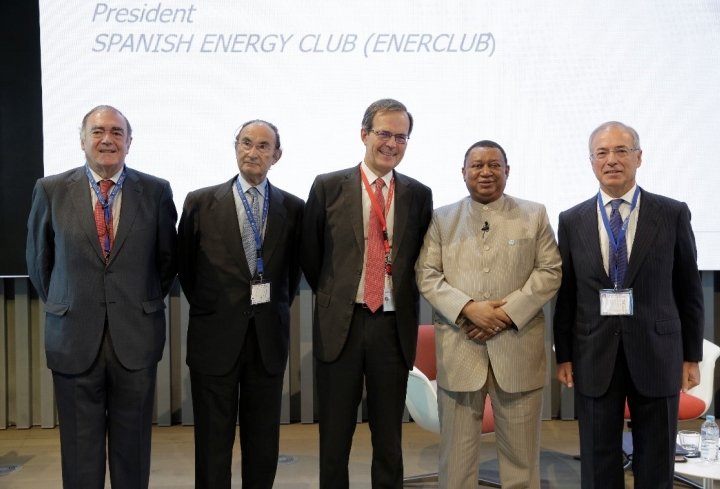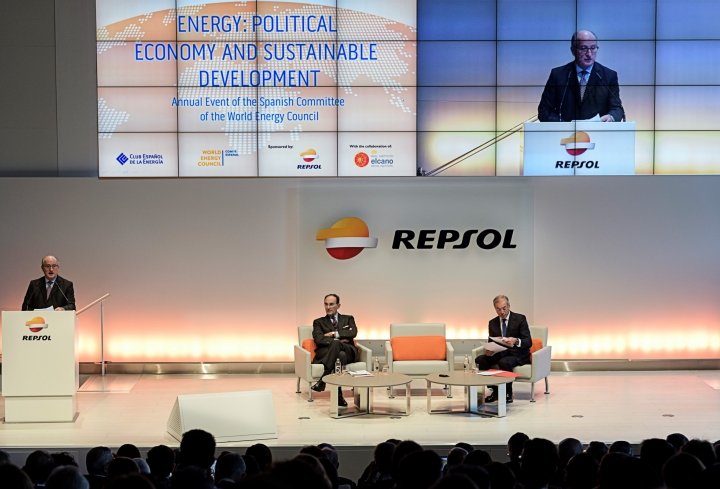The Spanish Committee of the World Energy Council (CECME, acronym in Spanish) represents the WEC in Spain and coordinates the participation of the Spanish energy industry in WEC’s activities, serving as liaison between WEC and the Spanish members. CECME is a part of the Spanish Energy Club (www.enerclub.es), which is a nonprofit organization with more than 300 Associates whose main goal is to contribute to a better understanding of the different energy issues. The main activities of the Spanish Committee include organizing energy-related events in Spain, representing CECME and the World Energy Council in national events, disseminating documentation and collaborating with World Energy Council and its working groups.
A naval engineer by training, Íñigo began his career in CEPSA in 1982. He has held various positions in the areas of Procurement, Aviation and Navy. In 2011 he was appointed Director of CEPSA Comercial Petróleo and since 2014 he has been responsible for the company’s Communications and Institutional Relations. Currently he is member of the Board of Directors.
Ana Padilla works as a Project Coordinator at the Spanish Energy Club and is based in Madrid, Spain. Ana joined the Spanish Energy Club in 2008. Prior to that, Ana worked at the International Energy Agency in Paris.
Energy in Spain
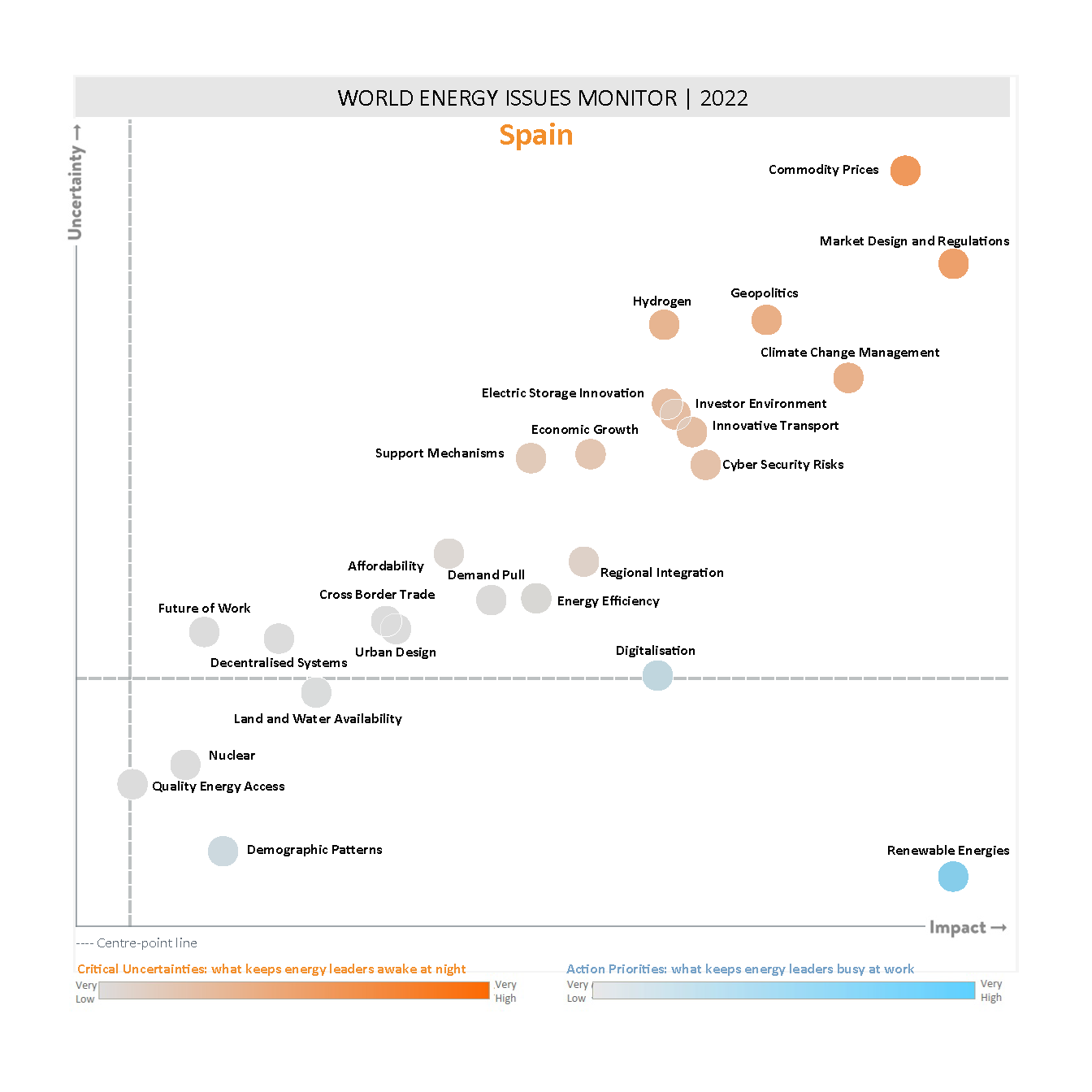
There is a steep increase in uncertainty in most issues, with commodity prices, market design, geopolitics, climate change, and hydrogen standing out as the top five critical uncertainties in Spain and bringing important challenges in the year ahead.
The context of high energy and commodities prices is having a big impact on the competitiveness of industries and companies, as well as for affordability in domestic consumers. The social impact is particularly important in Spain, due to the fact that 40% of small electricity consumers (included the most vulnerable eligible for rate reductions) are subject to regulated prices, which are linked to the wholesale spot market, thus the “media noise” generated. This situation might not be solved in the short term and the country will need to manage its consequences in a smart way, guaranteeing that short term measures don’t jeopardise long term objectives. Measures to protect the most vulnerable, including some companies are key.
As result of the previous, the debate about the need of adapting the current design and operation of the energy wholesale markets to the new realities have increased in intensity, recognising the importance of working in multiple areas. These, include those related to the remuneration for renewable energies and backup technologies, the demand response mechanisms, or the research for formulas that make retail prices less dependent from volatility, such as PPAs and long-term contracts.
A significant part of the energy prices hike is consequence of the uncertainties generated by the geopolitical situation, aggravated by the current tensions between Russia and Ukraine, with rising concerns on energy security, particularly in gas supply to the EU, and recalling the importance of having less energy dependence from third countries, and greater diversification. The fact that the link between energy and geopolitics is becoming more complex with new technologies, players and rivalries, has also contributed to the position of this issue in the critical uncertainties area.
The attention on Climate change and hydrogen have not gone away this year. Spain has approved its first Climate Change and Energy Transition Law in May 2021, complementing its National Integrated Energy and Climate Plan 2021-2030 (PNIEC), the Just Transition Strategy, and the Strategy for Decarbonisation of the economy for 2050. These documents which seek climate neutrality by the middle of the century at the latest, are main guidelines for the investments and recovery programmes.
Among transition technologies, Hydrogen continues having high uncertainty, but it is already keeping Spanish industry busy at work, as is responding with many projects and investments to the national ambitious goals on decarbonisation. The Green Hydrogen Roadmap published in 2020 stablished a target of 4 GW of electrolysers by 2030. The country has a privileged position to become a leader in this area due to its high level of renewables, a well-development infrastructure and industrial capacity. Economic, regulatory and technological challenges of its whole value chain have to be considered and resolved effectively. On the other hand, renewable energies, digitalisation and energy efficiency continue to be the main three Action Priorities in Spain, as these are considered key elements for its ecological and just transition.
The top priority action is once again renewable energies. Spain has overpassed its 20% renewable target for 2020 (+21,2% renewables in the gross final consumption, Eurostat), and the share of these technologies in electricity generation has reached in 2021 a historical record (46%, REE). The Government has continued facilitating the implementation of its 2030 goals (42% in the final energy use and 74% in power generation) and is trying to overcome some of related challenges, with new regulations on its economic regime, and the access and connection to the grid. However, more need to be done specially concerning speeding up administrative, network processes and new technologies promotion. Regarding the latter, the Offshore Wind and Marine Energy roadmap published in 2021 and the on-process Biogas Roadmap, are important steps forward. Social acceptance of new energy projects is also emerging as a new challenge.
The county has also accelerated the digital transformation of the economy with the impulse of its strategy plan launched in July 2020, reinforcing its leader positions in areas as connectivity, smart electricity meters (in nearly 100% homes) and smart cities. Significant opportunities are also seeing for energy efficiency, especially in building and transports. The Government has put in place several measures to activate the participation of consumers, as the Roadmap for Self-consumption (December 2021), or Energy Communities. Communication and education of society is one of the main challenges ahead in these areas. The way urban areas manage energy and affordability have also gained prominence as actions priorities in the transition.
TESTING PERSPECTIVES WITH THE WEC SPAIN MEMBER COMMUNITY
The results of the World Energy Issues Survey were discussed with WEC Spain members in February 2022. During the discussion, the key findings regarding Action Priorities and Critical Uncertainties were confirmed and the following three theses were highlighted:
- Spain's commitment to the ecological and just transition is clear. The country has great ambitions and a good position for this process. The answer to the current conjunctural situation of high energy prices, must be to assist the most vulnerable customers, and to accelerate the process, not to slow it down.
- There are great opportunities ahead to maintain and accelerate investments needed for the energy transition, especially for renewable energies across all areas and sectors, for which it is crucial to have a favourable framework. The mobilisation of resources from Next Generation EU, where more than 40% will support climate action, is an extraordinary opportunity. To manage the funds in an efficient and effective manner is crucial.
- There are important challenges ahead, in particular on communication and education of society. The process must have the citizens´ support. It must also be done taking advantage of the blooming sectors opportunities, to bring economy growth, employment and industrial competitiveness. In this area, the Just Transition Strategy, which intends to tackle some of these issues, has a big relevance.
Acknowledgements
Spain Member Committee
Ana Padilla Moreno
Downloads
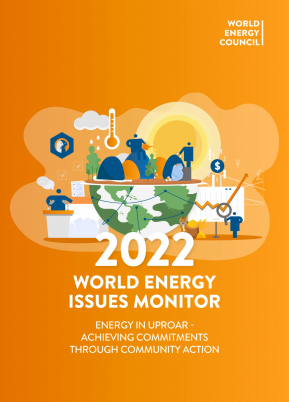
Spain Energy Issues Monitor 2022
Download PDF
World Energy Issues Monitor 2022
Download PDF


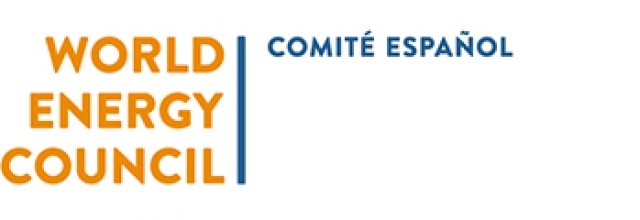



_368_520_s_c1_c_c.png)

